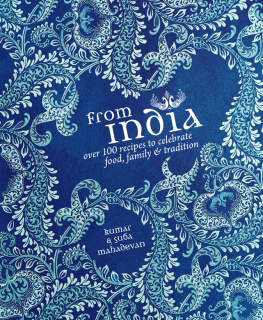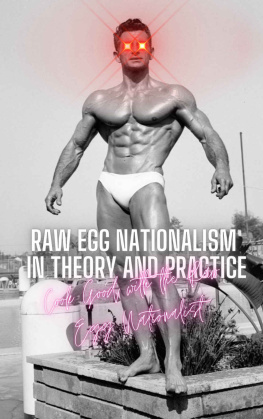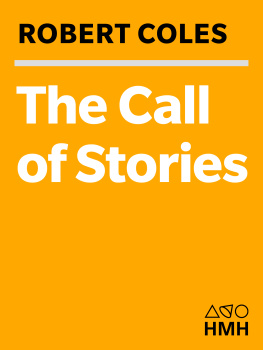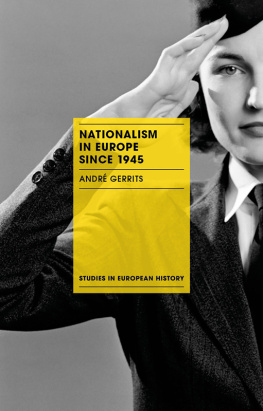THE POLITICAL LIFE OF CHILDREN
Books by ROBERT COLES
CHILDREN OF CRISIS: A Study of Courage and Fear
DEAD END SCHOOL
STILL HUNGRY IN AMERICA
THE GRASS PIPE
THE IMAGE IS YOU
WAGES OF NEGLECT
UPROOTED CHILD FARMERS
TEACHERS AND THE CHILDREN OF POVERTY
DRUGS AND YOUTH: Medical, Psychiatric and Legal Facts
ERIK H. ERIKSON: The Growth of His Work
THE MIDDLE AMERICANS
THE GEOGRAPHY OF FAITH: Conversations Between Daniel Berrigan, When Underground, and Robert Coles
MIGRANTS, SHARECROPPERS AND MOUNTAINEERS (Volume II of Children of Crisis)
THE SOUTH GOES NORTH (Volume III of Children of Crisis)
SAVING FACE
FAREWELL TO THE SOUTH
TWELVE TO SIXTEEN: Early Adolescence (with Jerome Kagan)
A SPECTACLE UNTO THE WORLD
RIDING FREE
THE OLD ONES OF NEW MEXICO
THE STUDENTS THEMSELVES
THE DARKNESS AND THE LIGHT
THE BUSES ROLL
IRONY IN THE MINDS LIFE: Essays on Novels by James Agee, Elizabeth Bowen, and George Eliot
HEADSPARKS
WILLAIM CARLOS WILLIAMS: The Knack of Survival in America
THE MINDS FATE
ESKIMOS, CHICANOS, INDIANS (Volume IV of Children of Crisis)
PRIVILEGED ONES: The Well-Off and the Rich in America
A FESTERING SWEETNESS
WOMEN OF CRISIS: Lives of Struggle and Hope (with Jane Hallowell Coles)
THE LAST AND FIRST ESKIMOS
WALKER PERCY: An American Search
FLANNERY OCONNORS SOUTH
WOMEN OF CRISIS, Volume II: Lives of Work and Dreams (with Jane Hallowell Coles)
I WILL ALWAYS STAY ME: Writings of Migrant Children (co-edited with Sherry Kafka)
DOROTHEA LANGE: Photographs of Lifetime
THE DOCTOR STORIES OF WILLIAM CARLOS WILLIAMS (ed.)
AGEE (with Ross Spears)
SEX AND THE AMERICAN TEENAGER
THE MORAL LIFE OF CHILDREN
IN THE STREET (with Helen Levitt)
DOROTHY DAY: A Radical Devotion
SIMONE WEIL: A Modern Pilgrimage
TIME OF SURRENDER: Selected Essays
HARVARD DIARY
THAT RED WHEELBARROW: Selected Literary Essays
THE CALL OF STORIES: Teaching and the Moral Imagination
RUMORS OF SEPARATE WORLDS
CHILD IN OUR TIMES: Studies in the Development of Resiliency (co-edited with Timothy Dugan)
THE SPIRITUAL LIFE OF CHILDREN
BREAKING THE CYCLE: Survivors of Child Abuse and Neglect (with Pamela Fong)
ANNA FREUD: The Dream of Psychoanalysis
THEIR EYES MEETING THE WORLD
COLLECTED ESSAYS
THE CALL OF SERVICE: A Witness to Idealism
THE STORY OF RUBY BRIDGES
HARVARD DIARY II: Essays on the Sacred and the Secular
THE MORAL INTELLIGENCE OF CHILDREN
THE YOUNGEST PARENTS (with John Moses and Jocelyn Lee)
DOING DOCUMENTARY WORK
OLD AND ON THEIR OWN
SCHOOL (with Nicholas Nixon)
DIETRICH BONHOEFFER (Modern Spiritual Masters Series)
THE SECULAR MIND
THE POLITICAL LIFE OF CHILDREN
ROBERT COLES

Copyright 1986 by Robert Coles
All rights reserved. No part of this book may be reproduced in any form or by any electronic or mechanical means, including information storage and retrieval systems, without permission in writing from the publisher, except by a reviewer, who may quote brief passages in a review. Any members of educational institutions wishing to photocopy part or all of the work for classroom use, or publishers who would like to obtain permission to include the work in an anthology, should send their inquiries to Grove/Atlantic, Inc., 841 Broadway, New York, NY 10003.
Published simultaneously in Canada
Printed in the United States of America
FIRST ATLANTIC MONTHLY PRESS PAPERBACK EDITION
Parts of this book, often in different form, have apeared in the following publications: Chapter I in The New York Review of Books; Chapter III in The Atlantic and The New Republic; Chapters VI and VIII in the Washington Post Magazine; and Chapter VIII in Harvard Educational Review.
Library of Congress Cataloging-in-Publication Data
Coles, Robert.
The political life of children.
Includes bibliographies and index.
1. Child analysis. 2. Children and politics.
I. Title.
RJ504.2.C65 1986 320.088054 85-22821
eBook ISBN-13: 978-0-8021-9657-6
Atlantic Monthly Press
841 Broadway
New York, NY 10003
To the memory of Dorothy Day
To Bob, Dan, Miketheir generations future
CONTENTS
THE POLITICAL LIFE OF CHILDREN
INTRODUCTION
THE first patient assigned to me when I began a residency in child psychiatry at Childrens Hospital in Boston was a twelve-year-old boy who had a number of phobias. I remember his mother arriving with him late, always late, because he was afraid to get on the subway, and also afraid to ride in cars, except in the country. He believed the chances of a city accident were substantial, and so he became nervous, jittery, reluctant to take his chances. Unfortunately the hospital was in a fairly crowded neighborhood and he could not avoid heavy traffic. By the time this boy and his mother entered our waiting room it was apparent that both had been through a lot.
I well recall my early conversations with him, because he did everything he could (so I decided at the time) to avoid discussing his worries and fears. Instead, he wanted to engage me in other discussions mostly about his hobbies. He had a vast collection of trains, which he ran on the railroad tracks that covered his bedroom, as well as other parts of his home. He also read many adventure books and had amassed an impressive stamp collection. I tried to be patient with him, let him show me his accomplishments, yet also move toward the subject at hand, his increasing withdrawal from the world. But I had less and less success doing so, as the weeks followed one another, until, finally, three months into treatment, I decided upon a showdown aided and abetted, I hasten to add, by my supervisor, an austere, brilliant, elderly psychoanalyst who kept telling me to remind the child why he was there. I now realize that the boy had, quite early, figured out why I lowered my voice and talked in such a cool, even-handed, deliberate manner. I was furious at him for obstructing the course of treatment, meaning me and my plans to become an able, accomplished child psychiatrist.
One day we reached a comic impasse. The boy told me I was as scared as he was scared I wasnt going to be able to budge him. I picked that up and asked him what he had in mind: budge him? He told me what he thought that I wanted him to talk only about matters I believed important, and that hed never get better if we kept that up. I was, he added, just like his father in that way. My eyes widened, of course, and I decided to relax a little and see where wed go if I avoided budging him. I leaned back, and said to myself Id try to be the model of the relaxed listener.
A few moments later the lad looked right at me, smiled, and told me he knew I was hiding something. My response was silence though I still remember the thump in my chest, a feeling of being caught doing something wrong. I hesitated to ask him what he meant because I feared Id sound as plaintive, uncertain, confused as I felt. At last he rescued me: I saw you one day, when I came to see the other doctor [the boy had a chronic, eczematous skin condition], and you were wearing a Stevenson button, and now youre not.
More silence on my part. The child really had discovered something. I had indeed made a point of taking off the political button I wore most of the day during the time spent with my young patients. At that time we in psychiatry and psychoanalysis were much taken with the notion of a value-free environment, and we all were making our gestures toward a distance from the dangerous swamps of familiarity, not to mention election-year partisanship. Let the patients make of you what they want, with as little help from you as possible, my supervisor had cautioned me repeatedly, while I tried to figure out what kind of a person he was, only to notice how few cues his office supplied, to say nothing of his verbal responses.
Next page















